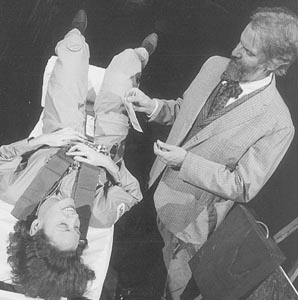![[Metroactive Stage]](/stage/gifs/stage468.gif)
[ Stage Index | Metro | Metroactive Central | Archives ]
The Defiant Ones
Ordinary people are heroes in drama about the space shuttle crash
By Heather Zimmerman
JANE ANDERSON'S unusual drama, Defying Gravity, could almost be the theatrical equivalent of Apple Computer's "Think different" campaign. Like those black-and-white billboards depicting 20th-century visionaries, Anderson's play makes the seemingly extraordinary accessible. But Apple puts within reach, for the price of an iMac, merely a taste of greatness. Not so in Defying Gravity, in which being a visionary lies within everyone's grasp. San Jose Stage Company has assembled an excellent cast for the West Coast premiere of Anderson's intriguing, if flawed, tribute to "ordinary" people of vision.
Defying Gravity tells the story of the days before the 1986 space shuttle Challenger disaster through a character known simply as the Teacher (Denise Balthrop Cassidy)--symbolically, she is never specifically identified as Christa McAuliffe. The Teacher's daughter, Elizabeth (Delia MacDougall), retells the events leading up to the launch, remembering as a child her difficulty in comprehending her mother's passion. Elizabeth's retrospective confessionals are coupled with flashbacks of chaotic domestic scenes as her mother juggles work, parenting and her new role as astronaut, contrasting the Teacher's "ordinary" roles with the fame she gained as part of the Challenger crew--before and after the disaster. Amy Glazer's sensitive direction captures both the hectic frustration of these scenes and their underlying poignancy.
Less effective is Anderson's paralleling of NASA's space explorations with the efforts of another individual who sought to gain a different "view" of the world: French Impressionist painter Claude Monet. His spirit wanders through scenes in which the Teacher, the space center workers and spectators anticipate the shuttle launch. Although Julian Lopez-Morillas is wonderful as Monet, the artist's presence sometimes seems more like a cautionary visit from the Ghost of Nonconformists Past than the inspiring apparition of a previous pioneer.
Fittingly, the virtues of Defying Gravity are truly in the ordinary. No characters provide a more revealing exploration of the play's theme of "seeing differently" than Ed and Betty (Don Hiatt and Linda Hoy), a retired couple touring the country in their Winnebago, who come to see the Challenger launch. Ed and Betty portray the human hunger for new knowledge just as well as the astronaut Teacher does; in each case, we see people reaching beyond limitations--whether it's age or fear--in order to learn and discover.
The greatest human feat recognized by Defying Gravity is the ability to communicate. In its capacity to forge relationships, which in turn inspire characters to do anything from going into space to overcoming a fear of heights, communication leads to triumph. And its absence can lead to tragedy, as a NASA ground-crew member describes how a failure to communicate likely led to the Challenger's loss.
It is also in the theme of communication that Anderson's comparison between space exploration and Impressionism works best. In their ability to touch others, Monet's innovative works have lived on, as have the memories of Christa McAuliffe and the Challenger crew. Each in individual ways sought to gain perspective on the human place in the universe.
[ San Jose | Metroactive Central | Archives ]
![]()

Launch Break: As she awaits the Challenger's launch, the Teacher (Denise Balthrop Cassidy) gets a visit from Claude Monet (Julian Lopez -Morillas) in 'Defying Gravity.'
Defying Gravity plays at the Stage Theater, 490 S. First St., San Jose; Wed.-Sat. at 8pm, Sun. at 2pm through Feb. 21. Tickets are $16-$22. For more information, call 408/283-7142.
From the February 4-10, 1999 issue of Metro.